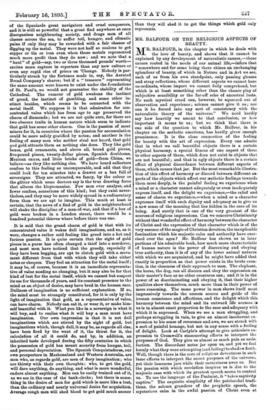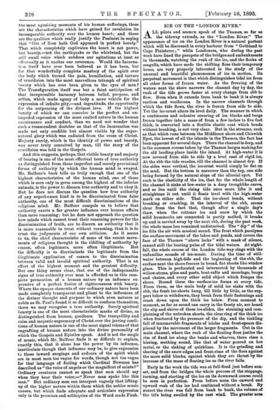MR. BALFOUR ON THE RELIGIOUS ASPECTS 01' BEAUTY.
MR. BALFOUR, in the chapter in which he deals with the love of beauty, and shows that it cannot be explained by any development of naturalistic causes,—those causes rooted in the needs of our animal life,—infers that "somewhere and for some being there shines an unchanging splendour of beauty, of which in Nature and in Art we see, each of us from his own standpoint, only passing gleams and stray reflections, whose different aspects we cannot here co-ordinate, whose import we cannot fully comprehend, but which is at least something other than the chance play of subjective sensibility or the fax-off echo of ancestral lusts. No such mystical creed can, however, be squeezed out of observation and experience ; science cannot give it us ; nor can it be forced into any sort of consistency with the naturalistic theory of the universe." We need hardly say how heartily we assent to that conclusion, or how important it seems to us ; but we think that there is one side of the question to which Mr. Balfour, in his chapter on the apathetic emotions, has hardly given enough prominence. It is the close connection of the feeling for beauty with the art of expression. Every one admits that in what we call beautiful objects there is a certain physical harmony, a special fitness of one aspect of them to other aspects of them, which does not exist in objects that are not beautiful ; and that in ugly objects there is a certain effect of physical discordance between different aspects of them, which causes that jar. But the most remarkable illustra- tion of this effect of harmony or discord between different as- pects of the objects which affect our apathetic feelings towards them most deeply, is the painful feeling we experience when a mind or a character cannot adequately or even inadequately express itself, and the delight we experience,—the relief and sense of charm we experience,—when a mind or a character expresses itself with such dignity and adequacy as to give us a new sense of the meaning that lies hidden in the core of its being. And surely that is one of the very greatest of the sources of religious impressions. Can we conceive Christianity without that wonderful effect of harmony between the character of Christ and the expression of that character which is of the very essence of the magic of Christian devotion, the inexplicable fascination which his majestic calm and authority have exer- cised over the ages ? Mr. Balfour has shown us in later portions of his admirable book, how much more characteristic of human nature is the power of discerning and obeying true authority, than it is of any of the lower animal natures with which we are acquainted, and he might have added that exactly in proportion as that power exists in the brute crea- tion, is the closeness of their approach to man. The elephant, the horse, the dog, can all discern and obey the expression on their master's face as no other creatures can ; and it is in the power of so discriminating and obeying it, that their higher qualities show themselves, much more than in their power of mere reasoning. The same power in man shows itself most impressively towards the unseen source and guide of the human conscience and affections, and the delight which this harmony between the mind and its outward life arouses :2 us is in almost exact proportion to the ease and adequacy with which it is expressed. When we see a man struggling, and perhaps struggling in vain, to give an almost incoherent ex- pression to his sense of reverence and awe, we are struck with a sort of painful homage, but not in any sense with a feeling
of delight. Look at Carlyle's attempt to give articulate ex- pression to Cromwell's stammering efforts to interpret the purposes of God. They give us almost as much pain as satis- faction. The discordant notes jar upon us, and yet we feel keenly what they were attempting (and failing) to shadow forth. Well, though there is the core of religious devoutness in such lame efforts to interpret the secret purposes of the universe, yet their lameness jars while their earnestness awes us. But the passion with which revelation inspires us is due to the majestic ease with which its greatest speech seems to control us. To use the language of the Psalmist, it "takes captivity captive." The exquisite simplicity of the patriarchal tradi- tions, the solemn grandeur of the prophetic speech, the mysterious calm in the awful passion of Christ even at the most agonizing moments of his human sufferings, these are the characteristics which have gained for revelation its incomparable authority over the human heart; and these are the qualities which really justify the Psalmist in saying that "Out of Zion hath God appeared in perfect beauty." That which completely captivates the heart is not power, but beauty,—not the earthquake or the whirlwind, but the still small voice which subdues our agitations at least as pffpctually as it excites our reverence. Would the Incarna- ti in itself have ever been believed as it has been, but for that wonderfully complete mastery of the spirit over the body which turned the pain, humiliation, and torture of crucifixion into the most marvellous triumph of spiritual beauty which has ever been given to the eyes of men P The Transfiguration itself was but a faint anticipation of that inexpressible harmony between belief, purpose, and action, which made agony of body a mere vehicle for the expression of infinite pity,—and ingratitude, the opportunity for the outpouring of the divinest love. If the highest beauty of which we can conceive is the perfect and un- impeded expression of the most exalted nature in the human countenance and conduct, then we need not wonder that such a transcendent doctrine as that of the Incarnation was made not only credible but almost visible by the super- natural glory which was radiated from the cross of Christ. Majesty surely, which is the identity of power and beauty, was never truly conceived by man, till the story of the crucifixion was told in the Gospels.
And this suggests, perhaps, that visible beauty and majesty of bearing is one of the most effectual testa of true authority as distinguished from those imperfect and merely provisional forms of authority by which the human mind is swayed. Mr. Balfour's book tells us truly enough that one of the highest characteristics of the human mind, one of those which is seen only in germ among the highest of the inferior animals, is the power to discern true authority and to obey it. But he does not discuss the question how true authority of any superhuman kind is to be discriminated from false authority, one of the most difficult discriminations of the religious mind. Mr. Balfour compels us to believe that authority exerts a far greater influence over human affairs than mere reasoning ; but he does not approach the question how minds which cannot trust their reasoning powers for the discrimination of truth, are to discern an authority that it is more reasonable to trust without reasoning, than it is to trust the judgments of our own criticism. As it seems to us, the chief characteristic of some of the recent move- ments of religious thought is the riddling of authority by reason, often legitimate, more often illegitimate. But the difficulty is to discriminate the legitimate from the illegitimate application of reason to the discrimination between valid and invalid spiritual authority. That is an effort of the highest moment and the greatest difficulty. But one thing seems clear, that one of the indispensable signs of true authority over man is afforded us in this com- plete permeation of a human nature by an influence ex- pressive of a perfect fusion of righteousness with beauty. Where the opaque elements of our ordinary nature have been made completely transparent and pliant to the influences of the diviner thought and purpose to which even natures as noble as St. Paul's found it so difficult to conform themselves, there we may recognise a true authority. Surely spiritual beauty is one of the most characteristic marks of divine, as distinguished from human, goodness. The tranquillity and calm and majestic supremacy of Christ over the jarring condi- tions of human nature is one of the most signal tokens of that engrafting of human nature into the divine personality of which the Gospels and Epistles speak. And is not the magic of music, which Mr. Balfour finds it so difficult to explain, exactly this, that it alone has the power by its influence, inarticulate though that influence may be, to give expression to those inward surgings and ardours of the spirit which are in most men too vague for words, though not too vague for that language of feeling which Cardinal Newman has described as "the voice of angels or the magnificat of saints P" Ordinary creatures cannot so speak that men should say when they hear their voice,—" Never man spake like this man." But ordinary men can interpret vaguely that lifting. up of the higher nature within them which the nobler music causes, but which finds adequate and articulate expression only in the promises and soliloquies of the Word made Flesh.



































 Previous page
Previous page